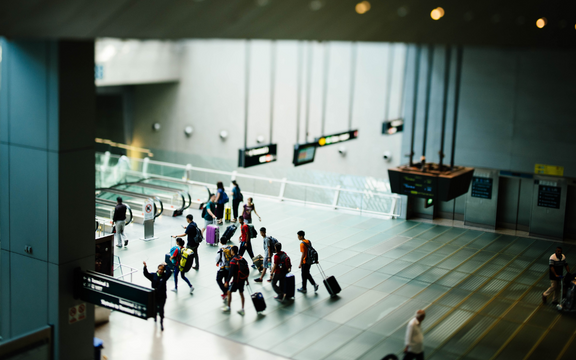Shop
Attention Travelers: Can Border Patrol Search Your Phone Without a Warrant?

As the holidays draw near, it's time to make arrangements for how we want to celebrate with friends and family. If your plan includes international travel across the U.S. border, you should know what to expect from border officials.
You may be surprised to learn that electronic information is subject to search, seizure, and analysis without a warrant. Like it or not,U.S. border officers can search your cell phone and other electronic devices.
Are you wondering about what border agents might be looking for? Here are some examples:
-
Evidence of working without a permit in the U.S.
-
Intent to marry
-
Pregnancy status
-
Intention of overstaying a visa
-
Illegal activities
-
Business being conducted in the U.S. on a tourist visa
Read on to learn more about how this works and what you can do to preserve the privacy of your personal information.
The Fourth Amendment
The Fourth Amendment to the U.S. Constitution guarantees American citizens the right to be free from unreasonable searches and seizures and requires warrants to be specific. A search warrant must be issued based on probable cause supported by oath. You might think this protects your phone and laptop from warrantless searches at the border, but that's not the case.
Your rights change when you leave the country as a U.S. citizen and return to cross the border. Two Supreme Court rulings determined this modification in 1976and 2004. Simply put, the U.S. government withdraws the protection of those rights from citizens to maintain the security of its national borders. This policy has several practical implications for international travelers this holiday season.
Can Customs Search Your Phone?
Can border patrol search your phone? The answer is generally yes. The Fourth Amendment does not protect data on your cell phone from warrantless searches at the border. However, you still have options.
You can opt to refuse access to your phone when traveling through an international airport. However, border agents have sufficient power to detain you for a time while attempting to hack into your phone. If you are a citizen, they cannot deny you entry into the country, but they can make things difficult for you.
A few somewhat vague conditions must be met for border patrol to take action. Federal agents can request your cell phone and password according to the law. If you provide your login credentials, they may scroll through your phone for a few minutes. This search can be done at any time, regardless of whether or not the border patrol agent has any valid suspicion.
CBP officers can conduct advanced searches if the conditions support a reasonable suspicion or national security concern. U.S. Customs and Border Protection (CBP) uses advanced extraction software from software companies such asCellebrite. Using Cellebrite's mobile forensics tool, Universal Forensics Extraction Device (UFED), border agents can breach various devices regardless of password protection, deleted data, and encryption.
Finally, if there is probable cause for the device to be connected with a crime, law enforcement agents can seize it as evidence.
What If I Have Confidential Files On My Device?
Correspondence between you and your doctor or lawyer is highly confidential anywhere in the U.S. However, there is no legal guarantee that border agents will comply with a statement that you have confidential information on your phone.
If you are a lawyer, you may have additional protection because of attorney-client privilege. In this case, border patrol has to get approval from an agency attorney before performing even basic searches on your device. If they receive the approval, they can still search your phone.
Each year, the number of devices searched in this manner is increasing. In 2015, there were just8,500 searches; by 2018, 33,000 devices were searched annually.
Isn't This A Rights Violation?
The answer is yes for many organizations, such as the American Civil Liberties Union (ACLU). Several lawsuits have been filed to protect the privacy rights of American citizens by rights groups. There is a concern about privacy and discrimination, as agents may do searches based on factors such as race.
In 2019, Ismail Ajjawi, a 17-year-old Palestinian from Lebanon, was denied access to the United States after border patrol agents searched his phone and found that some of his Facebook friends had posted political messages.
The young man was attempting to enter the United States after being accepted into Harvard University and stated that he had never posted anything political himself. This incident received attention from several free-speech advocates as an invasion of privacy and political freedom.
Whatever position the courts eventually take on these searches, they are an unfortunate reality for any of us wanting to visit friends or family outside the U.S. for the holidays. This point brings up the question, what can we do about it?
How To Protect Your Data From Warrantless Search
Ultimately, the best way to keep your data safe is to avoid bringing devices. Lawyers recommend using a pre-paid phone which you can discard at the end of your trip. However, this means you won't have the contact information or other features you may be used to.
If you decide to bring your phone through customs, be sure to turn it off before you get to the border. A phone is always more difficult to breach when turned off as opposed to when the screen is only locked. Switching your device off provides extra protection if your phone is searched.
Additionally, many phones provide you with the ability to encrypt your data. Encryption is strongly advised, as is using a strong password to lock your device.

Keep Your Devices Safe And Stay Healthy
Although a warrantless border search can feel violating, it isn’t very common. You can keep your data secure by taking a few steps to provide extra protection. It’s up to you to decide what information you feel comfortable storing on your phone when you go through customs. We recommend a “better safe than sorry” approach. We also recommend slipping your devices into aphone bag for extra security.
During your travels, another issue to be wary of is theft. Your devices, passport and credit cards represent a highly desirable target for thieves. That's why we recommend theSLNT Faraday Waterproof Backpack. Travel through airports, knowing that your devices and valuables are secure.
Recent Articles
Newsletter
Join Our Community: Privacy, Security, Health Updates
